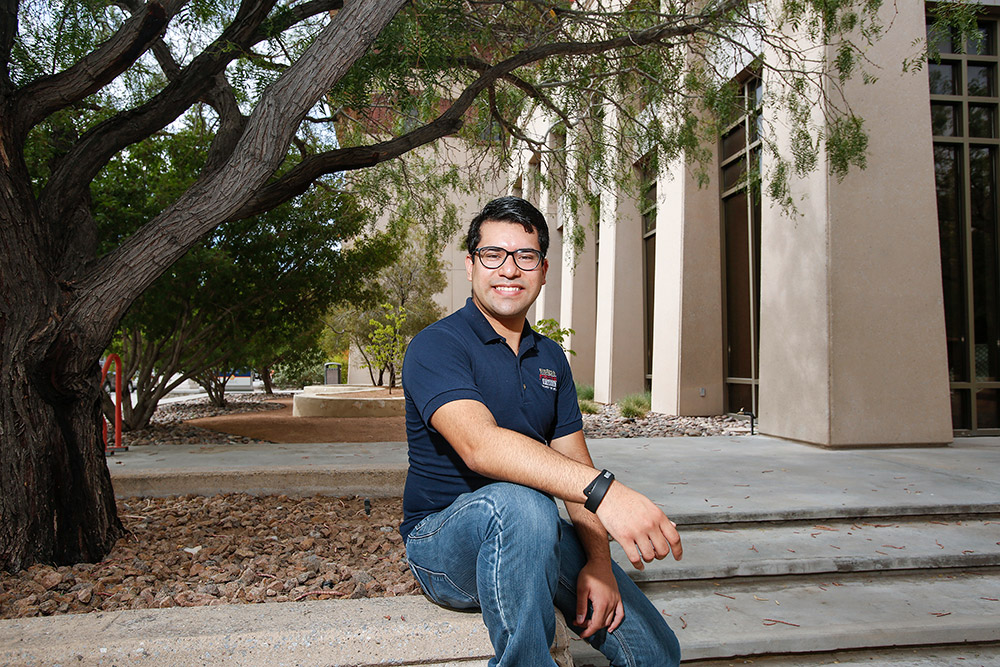New UTEP Degree Plan Offers Value, Flexibility
Last Updated on August 20, 2018 at 12:00 AM
Originally published August 20, 2018
By Daniel Perez
UTEP Communications
The University of Texas at El Paso takes another step in support of its access and excellence mission with the upcoming fall 2018 launch of a versatile undergraduate degree that should speed up degree completion at a fraction of the cost for some students.

UTEP administrators created the Bachelor of Applied Arts and Sciences (BAAS) degree specifically for individuals who earned an associate degree in a health occupation or technical field and now want to enhance their career options.
The degree plan is highly flexible through online and face-to-face classes with foundation courses in communication and rhetoric and writing studies, and several 15-hour concentration options that will align with the student’s interests. Participants enrolled in this degree program must complete 120 semester credit hours, but UTEP will accept 33 transfer credit hours as a technical block from the associate degree plan. That should trim at least a year and approximately $8,100 off the academic process.
Among those considering this new degree is Miguel Rojas, who earned his applied arts and sciences degree in sign language interpreter preparation from El Paso Community College (EPCC) in May 2018. The Lower Valley resident has been working as an interpreter to earn money to continue his education at UTEP.
“I’m interested in the (BAAS) program,” said Rojas, an El Paso native who called himself trilingual with a passion to assist those who need help to communicate. “I’m interested in whatever will help me earn a national certification in sign language interpretation.”
Documented interest in a BAAS-like degree at UTEP dates back to 1995, but the idea developed traction around 2015. The University wanted to create an option for those who earn an Associate of Applied Arts and Sciences degree.
EPCC graduates annually approximately 700 students with AAS degrees, which provide practical and theoretical background in a specialized area.The college offers about 50 concentrations in such areas as automotive technology, court reporting, culinary arts, fashion technology, fire technology, dental hygiene, and health information management.
One person involved in UTEP's journey to offer the BAAS program was Maryse Jayasuriya, Ph.D., associate dean for student affairs in the College of Liberal Arts, where the BAAS program resides. She said the team, which included members from many campus departments, was deliberate in its efforts to create a quality product.
UTEP administrators and faculty from Liberal Arts and Extended University, the campus’ online component, designed a program that ensured a rigorous curriculum. Jayasuriya said she was confident in the program, which is the 74th bachelor’s degree UTEP currently offers.
“It gives (students) the impetus they need,” Jayasuriya said. “This degree plan offers a wide range of students the flexibility they need and want within UTEP’s access and excellence model. It allows those students to move faster toward their goals.”
Among the early proponents was Bill Dethlefs, Ph.D., director of UTEP’s Center for Accommodations and Support Services. He wanted to see more certified sign language interpreters in the area to serve UTEP students, but many candidates left town to pursue other professional careers or a four-year degree, which is one of the criteria to become a nationally certified sign language interpreter.
Dethlefs said two-year degrees teach necessary skills, but the additional class time will broaden their intellectual abilities and make them more marketable. He said he hoped the curriculum eventually would include specialized American Sign Language courses in the fields of law and health care.
Beth Brunk-Chavez, Ph.D., dean of Extended University, became involved in the BAAS degree project about seven years ago and has seen it evolve. She said it made sense to include the BAAS degree in Extended University because it had the online course catalog to be effective and the capability to promote it. The promotional campaign for the online BAAS degree plan started this past spring.
“The BAAS degree provides another avenue for access for students,” Brunk-Chavez said, but added that each graduate will earn their diploma. “These are not simple degrees.”
The new program is similar to UTEP’s Bachelor of Multidisciplinary Studies (BMS), another flexible degree plan that UTEP launched in fall 2006. It allows students to work with a University adviser to build an academic plan based on their interests and the college credit hours that they already have accumulated.
Julio Rogers, a BMS program adviser and the college’s interim director of advising, has helped to counsel prospective BAAS students. He said each one has a unique background and comes with varied interests, but he enjoys the challenge.
“Each plan is tailored to the individual,” Rogers said. “Everyone picks their own path.”